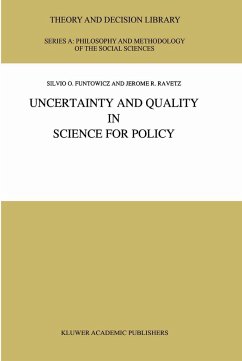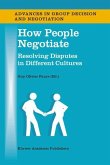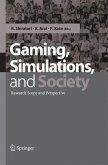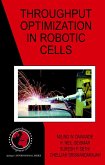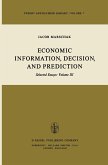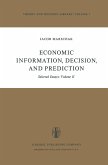Schade – dieser Artikel ist leider ausverkauft. Sobald wir wissen, ob und wann der Artikel wieder verfügbar ist, informieren wir Sie an dieser Stelle.
- Gebundenes Buch
- Merkliste
- Auf die Merkliste
- Bewerten Bewerten
- Teilen
- Produkt teilen
- Produkterinnerung
- Produkterinnerung
60 -I 137.0~29 ERROR BARS - tONE (1" 40 E a. a. Z30 137.0388 0 137.0377 ~ ~20 0 to 0 '50 Fig.1. Successive recommended values of the fine-structure constand IX-I (B. N. Taylor et 01., 1969,7) reminder that the value is not fully accepted by colleagues, since they will expect it to jump about for a while longer. Our next example is taken from a recent study in the social sciences. It shows how a set of related estimates of uncertainty can be expressed clearly and effectively by NUSAP. Suppose that we wish to forecast what the future price of a basic commodity might be, especially when at the…mehr
Andere Kunden interessierten sich auch für
![How People Negotiate How People Negotiate]() FaureHow People Negotiate77,99 €
FaureHow People Negotiate77,99 €![Gaming, Simulations and Society Gaming, Simulations and Society]() Rei Shiratori / Kiyoshi Araii / Kato Fumitoshi (eds.)Gaming, Simulations and Society115,99 €
Rei Shiratori / Kiyoshi Araii / Kato Fumitoshi (eds.)Gaming, Simulations and Society115,99 €![Causality and Causal Modelling in the Social Sciences Causality and Causal Modelling in the Social Sciences]() Federica RussoCausality and Causal Modelling in the Social Sciences104,99 €
Federica RussoCausality and Causal Modelling in the Social Sciences104,99 €![Causality and Causal Modelling in the Social Sciences Causality and Causal Modelling in the Social Sciences]() Federica RussoCausality and Causal Modelling in the Social Sciences104,99 €
Federica RussoCausality and Causal Modelling in the Social Sciences104,99 €![Throughput Optimization in Robotic Cells Throughput Optimization in Robotic Cells]() Milind W. DawandeThroughput Optimization in Robotic Cells164,99 €
Milind W. DawandeThroughput Optimization in Robotic Cells164,99 €![Economic Information, Decision, and Prediction Economic Information, Decision, and Prediction]() M. MarschakEconomic Information, Decision, and Prediction115,99 €
M. MarschakEconomic Information, Decision, and Prediction115,99 €![Economic Information, Decision, and Prediction Economic Information, Decision, and Prediction]() M. MarschakEconomic Information, Decision, and Prediction115,99 €
M. MarschakEconomic Information, Decision, and Prediction115,99 €-
60 -I 137.0~29 ERROR BARS - tONE (1" 40 E a. a. Z30 137.0388 0 137.0377 ~ ~20 0 to 0 '50 Fig.1. Successive recommended values of the fine-structure constand IX-I (B. N. Taylor et 01., 1969,7) reminder that the value is not fully accepted by colleagues, since they will expect it to jump about for a while longer. Our next example is taken from a recent study in the social sciences. It shows how a set of related estimates of uncertainty can be expressed clearly and effectively by NUSAP. Suppose that we wish to forecast what the future price of a basic commodity might be, especially when at the moment its price is artificially maintained by a cartel of producers. There is no experimental evidence on such a future contingency, and yet we are not completely in the dark. There is a long history of expertise in the field; and there is a well-tried standard model by which experts' guesses can be translated into mathematical form.
Produktdetails
- Produktdetails
- Theory and Decision Library A: 15
- Verlag: Springer / Springer Netherlands
- Artikelnr. des Verlages: 978-0-7923-0799-0
- 1990.
- Seitenzahl: 231
- Erscheinungstermin: 31. Oktober 1990
- Englisch
- Abmessung: 244mm x 161mm x 19mm
- Gewicht: 521g
- ISBN-13: 9780792307990
- ISBN-10: 0792307992
- Artikelnr.: 21142747
- Herstellerkennzeichnung
- Libri GmbH
- Europaallee 1
- 36244 Bad Hersfeld
- gpsr@libri.de
- Theory and Decision Library A: 15
- Verlag: Springer / Springer Netherlands
- Artikelnr. des Verlages: 978-0-7923-0799-0
- 1990.
- Seitenzahl: 231
- Erscheinungstermin: 31. Oktober 1990
- Englisch
- Abmessung: 244mm x 161mm x 19mm
- Gewicht: 521g
- ISBN-13: 9780792307990
- ISBN-10: 0792307992
- Artikelnr.: 21142747
- Herstellerkennzeichnung
- Libri GmbH
- Europaallee 1
- 36244 Bad Hersfeld
- gpsr@libri.de
S.O. Funtowicz is a Visiting Scientist at the European Community Joint Research Centre at Ispra (Varese), Italy. He has taught mathematics, logic and research methodology in Buenos Aires, Argentina. J.R. Ravetz is the Chairman of the Council for Science and Society in London. He was formerly Reader in the History and Philosophy of Science at the University of Leeds. His previous writings include Scientific Knowledge and its Social Problems (Oxford, 1971) and The Merger of Knowledge with Power (Cassel, 1990).
Prologue.- Introduction: Some Illustrative Examples.- 1. Science for Policy: Uncertainty and Quality.- 1.1 Information for Policy-Related Research.- 1.2 How to Cope with Uncertainty?.- 1.3 Dilemmas for Science.- 1.4 Quality Assurance and Policy.- 1.5 Uncertainty and Policy.- 2. Uncertainty and Its Management.- 2.1 Uncertainty in Probability.- 2.2 Statistics, Computers and Uncertainty.- 2.3 Types of Uncertainty.- 2.4 Uncertainty-Avoidance in Bureaucracies.- 2.5 Criticism: Technical, Methodological and Philosophical.- 2.6 The NUSAP Scheme, Uncertainty and Quality.- 2.7 NUSAP: Philosophy and Practice.- 3. The Mathematical Language.- 3.1 Historical Perspective.- 3.2 Mathematical Language and Uncertainty.- 3.3 Formalization and Infinite Regress.- 3.4 Rules: When to Over-Ride?.- 3.5 Ambiguity and Vagueness.- 3.6 Arithmetical Rules: The Fossils Joke.- 3.7 Zero: Counter or Filler?.- 3.8 Rounding-off: The ?-Dilemma.- 3.9 Craft Skills and "Monsters".- 4. Craft Skills with Numbers.- 4.1 Skills in Statistics.- 4.2 Skills in Cost-Benefit Analysis.- 4.3 Skills in Science.- 4.4 Degeneration of Skills.- 4.5 Policy-Related Research and Skills.- 4.6 New Skills for Policy-Related Research.- 4.7 Diffusing the Skills of Quality Assurance.- 5. Measurements.- 5.1 History in Science.- 5.2 Uncertainties at the Foundations of Science.- 5.3 N. R. Campbell: Measuring Length.- 5.4 Temperature: Measurement and Calculation.- 5.5 Uncertainties in Practice and Theory.- 5.6 Scientific Uncertainty: Philosophy and Practice.- 6. Maps.- 6.1 "Soft" Maps v. "Hard" Numbers.- 6.2 Maps and their Uncertainties.- 6.3 The "Border with Ignorance".- 6.4 Maps: Why Quality Counts.- 6.5 Intermediate Cases: Theme and Graph Maps.- 6.6 Graphs.- 6.7 Dials v. Digits.- 6.8 The Fruitful Vagueness of Maps.- 7.Mathematical Notations: Functions and Design.- 7.1 Mathematics and Symbolism.- 7.2 Designing for Uncertainty.- 7.3 Functions of Numbers.- 7.4 Names for Numbers: The "Billion" Story.- 7.5 Place-Value Scheme.- 7.6 Fruitful Contradiction.- 7.7 Symbolism in Chemistry.- 8. The NUSAP Scheme: Introduction.- 8.1 NUSAP: Design Criteria.- 8.2 NUSAP: Place-Value.- 8.3 Trading-Off Uncertainties.- 9. The NUSAP Categories: Numeral, Unit and Spread.- 9.1 Numeral.- 9.2 Unit.- 9.3 Numeral and Unit: Nuances of Expression.- 9.4 Spread.- 9.5 Topology: Grid and Resolution.- 9.6 Spread as a Quasi-Quantity.- 10. The NUSAP Categories: Assessment and Pedigree.- 10.1 Assessment.- 10.2 Examples of Assessment.- 10.3 Pedigree.- 10.4 The Pedigree Matrix for Research.- 10.5 Applications of Pedigree.- 10.6 A NUSAP Expression for a Policy Forecast.- 10.7 Pedigrees for Environmental Models and for Functional Quality.- 10.8 Elicitation: Use and Design of Pedigree.- 11. The NUSAP Pedigree for Statistical Information.- 11.1 Statistical Information: Its Production in Bureaucracies.- 11.2 The Pedigree Matrix.- 11.3 Practical Problems.- 11.4 An Illustrative Example.- 11.5 Indicators: The Elucidation of Quality.- 12. Mapping Uncertainties of Radiological Hazards.- 12.1 Quality of Radiological Data.- 12.2 Quality Evaluation for Radiological Model Parameters.- 12.3 Illustration of Pedigree Ratings for Model Parameters.- 12.4 Parameter Uncertainty and Model Reliability.- 12.5 Parameter Contribution to Model Spread.- 12.6 Illustrative Example.- 13. Further Applications of The NUSAP System.- 13.1 An Arithmetic for Assessment.- 13.2 An Example: The Valuation of Ecosystems.- 13.3 Risk Indices: A NUSAP Analysis.- 13.4 Calculating the Risk Indices for Energy Technologies.- Epilogue.- References.
Prologue.- Introduction: Some Illustrative Examples.- 1. Science for Policy: Uncertainty and Quality.- 1.1 Information for Policy-Related Research.- 1.2 How to Cope with Uncertainty?.- 1.3 Dilemmas for Science.- 1.4 Quality Assurance and Policy.- 1.5 Uncertainty and Policy.- 2. Uncertainty and Its Management.- 2.1 Uncertainty in Probability.- 2.2 Statistics, Computers and Uncertainty.- 2.3 Types of Uncertainty.- 2.4 Uncertainty-Avoidance in Bureaucracies.- 2.5 Criticism: Technical, Methodological and Philosophical.- 2.6 The NUSAP Scheme, Uncertainty and Quality.- 2.7 NUSAP: Philosophy and Practice.- 3. The Mathematical Language.- 3.1 Historical Perspective.- 3.2 Mathematical Language and Uncertainty.- 3.3 Formalization and Infinite Regress.- 3.4 Rules: When to Over-Ride?.- 3.5 Ambiguity and Vagueness.- 3.6 Arithmetical Rules: The Fossils Joke.- 3.7 Zero: Counter or Filler?.- 3.8 Rounding-off: The ?-Dilemma.- 3.9 Craft Skills and "Monsters".- 4. Craft Skills with Numbers.- 4.1 Skills in Statistics.- 4.2 Skills in Cost-Benefit Analysis.- 4.3 Skills in Science.- 4.4 Degeneration of Skills.- 4.5 Policy-Related Research and Skills.- 4.6 New Skills for Policy-Related Research.- 4.7 Diffusing the Skills of Quality Assurance.- 5. Measurements.- 5.1 History in Science.- 5.2 Uncertainties at the Foundations of Science.- 5.3 N. R. Campbell: Measuring Length.- 5.4 Temperature: Measurement and Calculation.- 5.5 Uncertainties in Practice and Theory.- 5.6 Scientific Uncertainty: Philosophy and Practice.- 6. Maps.- 6.1 "Soft" Maps v. "Hard" Numbers.- 6.2 Maps and their Uncertainties.- 6.3 The "Border with Ignorance".- 6.4 Maps: Why Quality Counts.- 6.5 Intermediate Cases: Theme and Graph Maps.- 6.6 Graphs.- 6.7 Dials v. Digits.- 6.8 The Fruitful Vagueness of Maps.- 7.Mathematical Notations: Functions and Design.- 7.1 Mathematics and Symbolism.- 7.2 Designing for Uncertainty.- 7.3 Functions of Numbers.- 7.4 Names for Numbers: The "Billion" Story.- 7.5 Place-Value Scheme.- 7.6 Fruitful Contradiction.- 7.7 Symbolism in Chemistry.- 8. The NUSAP Scheme: Introduction.- 8.1 NUSAP: Design Criteria.- 8.2 NUSAP: Place-Value.- 8.3 Trading-Off Uncertainties.- 9. The NUSAP Categories: Numeral, Unit and Spread.- 9.1 Numeral.- 9.2 Unit.- 9.3 Numeral and Unit: Nuances of Expression.- 9.4 Spread.- 9.5 Topology: Grid and Resolution.- 9.6 Spread as a Quasi-Quantity.- 10. The NUSAP Categories: Assessment and Pedigree.- 10.1 Assessment.- 10.2 Examples of Assessment.- 10.3 Pedigree.- 10.4 The Pedigree Matrix for Research.- 10.5 Applications of Pedigree.- 10.6 A NUSAP Expression for a Policy Forecast.- 10.7 Pedigrees for Environmental Models and for Functional Quality.- 10.8 Elicitation: Use and Design of Pedigree.- 11. The NUSAP Pedigree for Statistical Information.- 11.1 Statistical Information: Its Production in Bureaucracies.- 11.2 The Pedigree Matrix.- 11.3 Practical Problems.- 11.4 An Illustrative Example.- 11.5 Indicators: The Elucidation of Quality.- 12. Mapping Uncertainties of Radiological Hazards.- 12.1 Quality of Radiological Data.- 12.2 Quality Evaluation for Radiological Model Parameters.- 12.3 Illustration of Pedigree Ratings for Model Parameters.- 12.4 Parameter Uncertainty and Model Reliability.- 12.5 Parameter Contribution to Model Spread.- 12.6 Illustrative Example.- 13. Further Applications of The NUSAP System.- 13.1 An Arithmetic for Assessment.- 13.2 An Example: The Valuation of Ecosystems.- 13.3 Risk Indices: A NUSAP Analysis.- 13.4 Calculating the Risk Indices for Energy Technologies.- Epilogue.- References.

